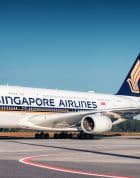Following on the heels of Aeroplan’s exciting new partnership with Etihad Airways, today Canada’s most popular frequent flyer program has added yet another international partner: Azul Brazilian Airlines, one of the major airline carriers in Brazil.
Starting today, Aeroplan members can earn and redeem miles on Azul-operated flights to any of the 112 destinations they serve out of their hub airport in Campinas, just outside of São Paulo.
The buzz around this announcement will no doubt be tempered by the fact that there’s almost no demand for travel to Brazil right now due to their out-of-control COVID-19 pandemic. However, Brazil is one of my favourite places to visit during normal times, and I’m excited to take advantage of this partnership sometime in the future.
Redeem Aeroplan Miles on Azul Airlines
Similar to Etihad, Azul will also take its place seamlessly alongside the other 35 Aeroplan partner airlines, which means that:
-
Azul flights will be subject to Aeroplan’s Fixed Mileage Flight Reward chart, available here.
-
Members will be able to book Azul flights online at Aeroplan.com as well as via the contact centre.
-
Azul flights can be combined with flights operated by Air Canada and our other international partners.
-
Fuel surcharges will not apply on Azul operated flights.
Azul’s flights have already been loaded into the Aeroplan online search engine, so you’re free to go ahead and book. Some of the key mileage prices for travel to South America include:
-
30,000 or 55,000 miles one-way from North America to Southern South America (including Brazil, Argentina, and Uruguay) in economy class or business class, respectively
-
40,000 or 75,000 miles one-way from Europe to Southern South America (including Brazil, Argentina, and Uruguay) in economy class or business class, respectively
-
15,000 or 30,000 miles one-way within Southern South America (including Brazil, Argentina, and Uruguay) in economy class or business class, respectively

The fact that Azul flights can be combined with Air Canada and other international partners means that you may build your own segment-by-segment routing and book it over the phone, while respecting the maximum permitted mileage (MPM) policies.
Azul runs their Airbus A330s with lie-flat reverse herringbone business class seats to two North American airports: Fort Lauderdale and Orlando. Both can be combined with Air Canada or United flights to connect down to Brazil from your chosen point of origin:

They also operate an Airbus A330 to Lisbon, which would be a very interesting transatlantic crossing on an Aeroplan Mini-RTW or similar itinerary.

Note that many of Azul’s intra-Brazilian routes are operated by economy-only aircraft, but the routes themselves should still open up additional destinations within Brazil that weren’t previously accessible.
For example, ever since Avianca Brazil folded, it has been tough to fly into the city of Foz do Iguaçu on an Aeroplan itinerary for a trip to the majestic Iguazu Falls:

Another destination in Brazil that I’ve had my eye on for the next trip is the island of Fernando de Noronha off the northeastern coast, which is also well-served by Azul:

However, it looks like a one-way from Viracopos Airport to Fernando de Noronha (FEN) is pricing out at 27,500 miles one-way for some reason. Who knows, Aeroplan has been known to code stuff funnily in the past.
Speaking of which, what exactly is Viracopos Airport (VCP)? Well, Aeroplan describes it as “São Paulo Viracopos”, but that’s a bit of a misnomer because the airport is located in a separate municipality of Campinas about 100km outside of the São Paulo city boundaries.

The good news is that since Azul uses Viracopos as their hub, they run a fleet of free shuttle buses from Viracopos into the São Paulo city centre, as well as to São Paulo’s other airports (Guarulhos, the main international airport, and Congonhas, the domestic one).
However, Viracopos is certainly the least convenient of São Paulo’s three airports, so Azul as an airline (and therefore its partnership with Aeroplan) is almost better positioned for transiting through Viracopos on your way to other destinations than for actually visiting Brazil’s largest city.
Prior to the Azul partnership, there was a notable weakness in terms of Aeroplan’s coverage in South America, which largely coincides with the wider Star Alliance’s lack of coverage in that continent.
Aeroplan had also partnered with Gol Airlines, another Brazilian low-cost carrier, but Gol flights were never bookable online, and even the ExpertFlyer award space did not always match up with what Aeroplan agents could book over the phone. It seems to me that Azul will now be the dominant Aeroplan partner in Brazil, with a much less significant role for Gol going forward.

Azul A330 business class
Earn Aeroplan Miles on Azul
If you happen to fly with Azul in the future, then you can also earn Aeroplan miles by entering your Aeroplan frequent flyer number on the ticket. Almost all the Brazilian airlines have very affordably priced tickets for domestic travel within Brazil, so this is one reason to choose Azul over the other airlines.
The earning rates for Azul flights are as follows:

The cheapest domestic tickets will likely fall into the lowest economy fare buckets, though, so the amount of miles you earn are not likely to add up to anything significant, but it’s still better than nothing.
Conclusion
Aeroplan linking up with Azul Brazilian Airlines represents another step in the direction of an expanded and evolved loyalty offering, especially as they gear up for the launch of a new program in Quarter 4 of 2020. I have a feeling this won’t be the last new partner, either.
The Azul partnership provides much-needed coverage in the continent of South America, as the existing Gol partnership was quite lacking in terms of the user experience (not to mention that Azul’s lie-flat business class seats make it a more attractive airline to fly with than its low-cost counterpart).
Unlike when the Etihad Airways partnership was announced, I can’t imagine there will be a mad-dash of Aeroplan bookings on Azul at this time, given the state of the COVID-19 pandemic within Brazil’s borders. In the long term, however, I’d love to redeem Aeroplan miles to fly one of Azul’s A330s down to Brazil – all with minimal surcharges and ample award availability – sometime in the future.















VCP is highly inconvenient depending on where in the state of S√£o Paulo you are going (in my case, it adds the 100km and 2 very expensive tolls on the highway on the way to my family). However, it can be very convenient if your final destination is closer to VCP. I personally book UAL to avoid Aeroplan surcharges.
Fernando de Noronha is sometimes treated as Hawaii by Brazilian airlines – a premium on redemption rates. An alternative is fly to REC and from there pay out-of-pocket for a flight to Fernando de Noronha – which is COMPLETELY worth the hassle of getting there!
Thanks for the insight Ana Luiza! I accidentally booked to VCP instead of GRU or CGH on a TAM ticket back in 2014, not knowing any better. My friends who were picking me up from the airport weren’t very happy about that! 🙂
Can’t wait to check out Fernando de Noronha for myself. Thanks for the tip on Recife, I’ll be sure to keep it in mind.
I guess one return ticket from YYZ-Europe (stopover)-Brazil(destination)-YYZ is over the mileage. Is this correct? Thanks!
That would be – but something like YVR-YYZ-LIS-VCP should be within the MPM.
Fernando de Noronha!
Finally a reasonable way to get to Fernando de Noronha.